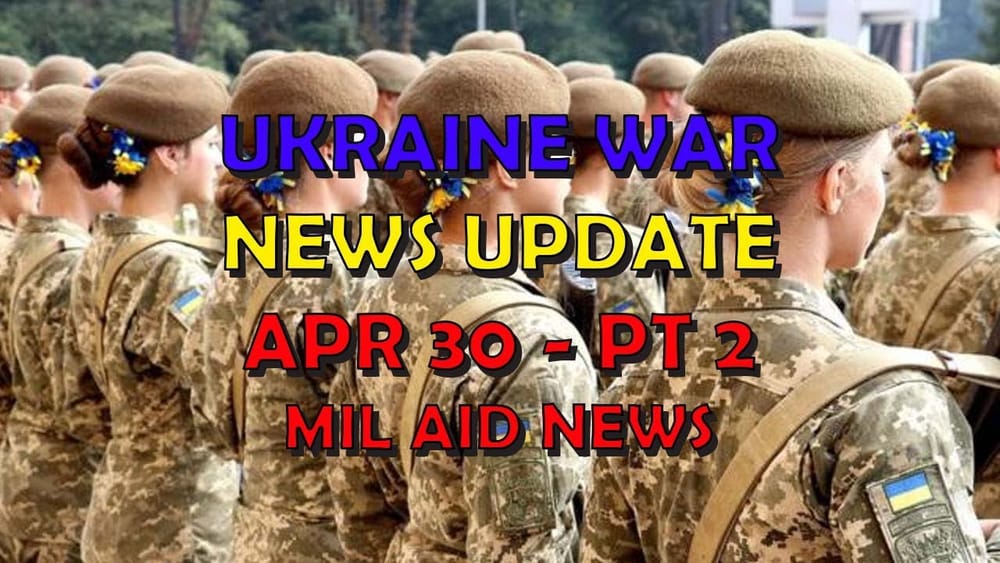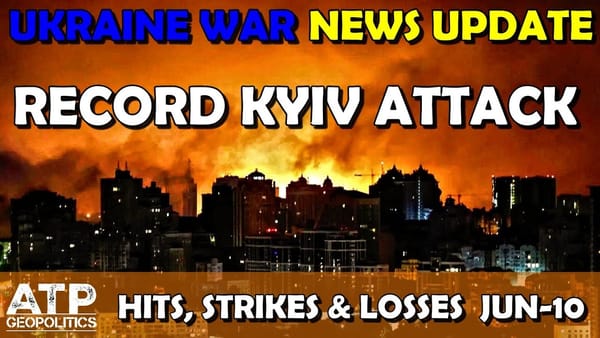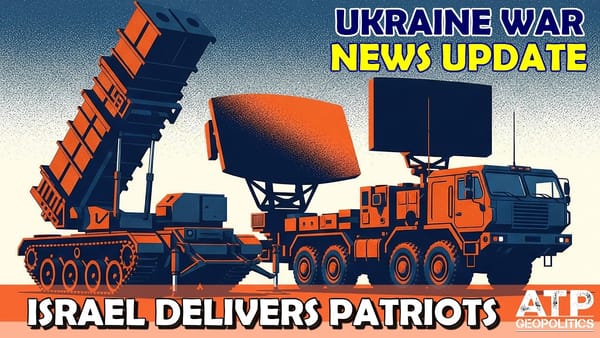Ukraine War Update NEWS: Military Aid News
Table of Contents 📖
"It's literally the thing that will change it, and by not giving it, that won't change anything, and you are... you are just assuming the... you're putting a hot cup for the horse. It's all kind of circular reason, etc., etc. You get my point."
Hello Team
🎦 00:00-00:16⏩
Jonathan welcomes viewers to another ATP Geopolitics video, a Ukraine War News Update, specifically the second part focusing on military aid, on the 30th of April 2024.
Return to top⤴️
NATO's Proposed $100 Billion Fund for Ukraine
🎦 00:16-02:16⏩
Jonathan discusses Zelensky's meeting with NATO Secretary General Jens Stoltenberg, where a potential $100 billion NATO fund for Ukraine over five years was reportedly discussed. This fund aims to provide long-term financial assistance to Ukraine for its defence against Russia. This funding is in addition to existing bilateral agreements on security guarantees. Jonathan emphasizes the significance of this aid, drawing a parallel to the Second World War when the US made substantial investments to maintain global security. He highlights that supporting Ukraine financially now is crucial for global stability, even if it requires sacrifices from taxpayers.
Return to top⤴️
The Just World Fallacy and the Cost of Global Security
🎦 02:16-07:27⏩
Jonathan delves into a philosophical tangent about the “just-world theory," the human tendency to believe that the world is inherently fair. He argues that this belief is a fallacy and that life often presents unforeseen challenges, like a natural disaster, that require us to shoulder financial burdens for the greater good. Jonathan connects this to the Ukraine war, underscoring that while increased taxes to support Ukraine might feel unfair, it is a necessary investment to counter Putin’s aggression and safeguard global security.
Return to top⤴️
Germany's Military Aid to Ukraine
🎦 07:27-09:19⏩
Jonathan clarifies that, contrary to some reports, Germany has not announced a new $1.13 billion aid package. He provides a breakdown of military equipment delivered by Germany to Ukraine in the past three weeks, including a Skynex air defence system, Marder infantry fighting vehicles, Oshkosh trucks, and various ammunition types. He also highlights Germany's pledge to send another Patriot air defence system in the future.
Return to top⤴️
Germany’s €1.13 Billion Aid Package from February
🎦 09:19-10:26⏩
Jonathan revisits Germany's previously announced €1.13 billion aid package from February 18th, which includes 18 Panzerhaubitze 2000s, 18 RCH-155 self-propelled howitzers, two Skynex air defence systems, missiles, and shells. He notes that the delivery timeframe for some of this equipment extends to 2025-2027, highlighting Germany's commitment to long-term support. Jonathan advises caution in interpreting information, even from mainstream media sources, as they sometimes make significant errors.
Return to top⤴️
Australia's Military Aid Package Breakdown
🎦 10:26-11:12⏩
Jonathan, in his attempt to perfect his Australian accent, provides a detailed breakdown of Australia's recently announced military aid package for Ukraine. The package includes $50 million for a short-range air defence system, $30 million for unmanned aerial systems, and $15 million for other essential equipment, such as combat helmets, inflatable boats, fire masks, and generators.
Return to top⤴️
GLSDB Performance and Electronic Warfare Challenges
🎦 11:12-12:55⏩
Jonathan addresses concerns regarding the effectiveness of GLSDBs (Ground Launched Small Diameter Bombs). Citing information from defence analyst John Ridge, Jonathan explains that while firmware updates have addressed some issues related to Russian GPS jamming, Ukrainian forces still face challenges in mission planning due to the threat of electronic warfare.
Return to top⤴️
France's Transition to War Economy and Increased Missile Production
🎦 12:55-14:32⏩
Jonathan discusses France's shift towards a "war economy" to boost arms production for Ukraine. He highlights French Defence Minister Sébastien Lecornu's announcement of administrative measures that prioritise military orders over civilian ones, emphasizing the seriousness of the situation. Specifically, Jonathan points to the prioritisation of MBDA's production of Aster missiles, which are crucial for Ukraine's air defence.
Return to top⤴️
France's Prioritization of Military Orders and Comparison to Russia's Economy
🎦 14:32-16:21⏩
Jonathan elaborates on the implications of France's transition to a "war economy," drawing a parallel to Russia's current economic model, where the government prioritises defence manufacturing. He describes how the French government can now legally compel civilian companies to prioritise military contracts over civilian ones, illustrating this with an example of a company forced to produce components for Aster missiles instead of fulfilling a civilian contract. Jonathan views the adoption of such measures in France and potentially the UK as both good news for Ukraine and an indicator of the gravity of the situation. He also mentions France's provision of €633,394 worth of medical supplies and neonatal equipment to Ukrainian hospitals.
Return to top⤴️
Destroyed Italian Puma IFV in Ukraine
🎦 16:21-16:52⏩
Jonathan notes the reported destruction of an Italian-made Puma infantry fighting vehicle (IFV) in Ukraine's Luhansk region. This revelation came as a surprise, as Italy, like some other nations, has maintained secrecy about its military aid to Ukraine. The presence of the Puma IFV in Ukraine was previously undisclosed.
Return to top⤴️
The Challenges of Mobilization and Ukraine’s Need to Involve Women
🎦 16:52-19:43⏩
Jonathan delves into the complex issue of mobilisation, particularly the challenges Ukraine faces. He argues for the necessity of involving more women in various roles within the military, beyond just frontline combat. He contends that relying solely on men limits the pool of potential recruits and advocates for a more inclusive approach to mobilization, considering age and gender. He uses the example of demining, suggesting that older individuals could replace younger ones in such roles, freeing them for other duties.
Return to top⤴️
Ukraine's Efforts to Involve Women in Demining and Drone Warfare
🎦 19:43-20:06⏩
Jonathan highlights Ukraine's efforts to engage women in demining and drone warfare. He mentions Deputy Prime Minister Olha Stefanishyna's statement about Ukraine's limited resources for demining and the need to involve women. Additionally, he cites the formation of an all-female drone unit, with selection based on rigorous criteria, including combat mission assessments, training verification, and security clearances.
Return to top⤴️
Contrasting Approaches to Mobilization: Estonia and Lithuania
🎦 20:06-21:20⏩
Jonathan contrasts the approaches of Estonia and Lithuania towards the mobilization of Ukrainian men residing within their borders. Estonia has stated that they will not extradite men of draft age to Ukraine, emphasizing that mobilization is a matter between a state and its citizens. Conversely, Lithuania's president supports the return of such men to Ukraine, believing that Ukraine has the right to call upon its citizens for military service.
Return to top⤴️
Potential Consequences of Differing Mobilisation Policies in Europe
🎦 21:20-22:11⏩
Jonathan ponders the potential ramifications of divergent mobilization policies within Europe, drawing an analogy to tax havens. He speculates whether differing stances on returning Ukrainian men of military age could lead to a situation akin to tax havens, with individuals potentially relocating to countries like Estonia to avoid conscription. He underscores the importance of regulatory alignment, particularly within structures like the European Union, to address such challenges effectively. He acknowledges his previous error in conflating Slovakia and the Czech Republic.
Return to top⤴️
Slovakia's Refusal of Military Aid and Public Backlash
🎦 22:11-24:09⏩
Jonathan criticises Slovakian Prime Minister Robert Fico's stance on Ukraine, who has refused to provide military aid while simultaneously allowing Slovakia's defence industry to fulfil existing contracts with Ukraine. Jonathan condemns Fico's hypocrisy, likening his position to a willingness to profit from actions he morally opposes. In response to Fico's stance, Slovakian citizens have independently raised €4 million to purchase ammunition for Ukraine, a move Jonathan applauds. Jonathan further criticizes Fico's assertion that aid to Ukraine is futile, arguing that withholding support becomes a self-fulfilling prophecy.
Return to top⤴️
Russian Mobilization in Occupied Territories
🎦 24:09-25:11⏩
Jonathan reiterates his point from a previous video about Russia's ongoing mobilisation efforts, even within occupied Ukrainian territories. He highlights the challenge this poses for Ukraine, as Russia continues to replenish its ranks by conscripting men from these areas.
Return to top⤴️
Concerns over Circumventing Sanctions and China’s Role in Aiding Russia
🎦 25:11-26:39⏩
Jonathan addresses a comment from a viewer (Trent Elenka) concerning the lack of sanctions against Chinese firms supplying Russia. He expresses concern over the broader issue of countries circumventing sanctions, providing evidence that Russia's imports of key military goods have significantly increased since spring 2023, with China playing a major role. He also mentions the ineffectiveness of the oil price cap imposed on Russia, as reported by a maritime insurer.
Return to top⤴️
North Korean Missile Debris in Ukraine and Russia’s Veto of UN Sanctions Monitors
🎦 26:39-28:35⏩
Jonathan discusses the discovery of debris from a North Korean missile in Kharkiv, Ukraine, a potential violation of UN sanctions. Although UN monitors confirmed the debris originated from a North Korean missile, they couldn’t definitively determine the launch location or who controlled the launch. Jonathan expresses concern over Russia's recent veto of the annual renewal of UN sanctions monitors tasked with overseeing sanctions on North Korea's nuclear and ballistic missile programs, viewing it as a blatant attempt to evade accountability.
Return to top⤴️
Viewer Comment: Lack of Ukrainian Fortifications
🎦 28:35-31:54⏩
Jonathan addresses a viewer comment from “Kasparawi” regarding the lack of substantial Ukrainian fortifications behind Ocheretyne, north of Avdiivka. He cites Polish defence expert Jasek Bartosiek, who claims the decision not to fortify this area was likely politically motivated to avoid demoralizing the local population. Jonathan analyses the potential reasons behind this decision, speculating that constructing visible fortifications might have been perceived as signalling an acceptance of territorial loss and emboldening Russia's demands in potential negotiations. He also acknowledges the logistical challenges of constructing such defences and the debate about funding and resource allocation.
Return to top⤴️
Impact of Frontline Performance on Mobilization
🎦 31:54-32:23⏩
Jonathan connects the lack of robust Ukrainian defences to the challenges of mobilization, arguing that successful defence and a perception of strength are vital for boosting morale and encouraging enlistment. He contends that a more secure frontline, bolstered by strong fortifications, would instil greater confidence in potential recruits and improve Ukraine's chances of mobilizing the necessary manpower.
Return to top⤴️
Wrap up
🎦 32:23-32:23⏩
Jonathan concludes the video by expressing his hope that the insights shared have been valuable and bids his viewers farewell.
Return to top⤴️



